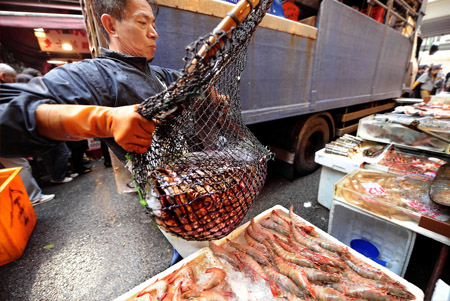Economy
Working hard to satisfy festival appetites in HK, Macao
(China Daily)
Updated: 2011-02-17 14:00
 |
Large Medium Small |
|
 |
|
A worker carries a large fish to a market stand in Causeway Bay in Hong Kong on Feb 2. [Photo / Agencies] |
GUANGZHOU - He Hanbiao has spent the past 12 Spring Festivals hard at work.
This year, when the country celebrated the lunar new year with family reunions, He, a clerk with the Zhongshan Port branch of Zhongshan exit-entry quarantine and inspection bureau, has been busy since Feb 2 expanding the inspection and quarantining of fish and other freshwater produce sold to the Hong Kong and Macao special administrative regions.
"Festivals are usually the busiest time for me and my colleagues. My family and I have come to an understanding," he said.
As a major freshwater fish export base, the city of Zhongshan, in Guangdong province, sells more than 80 tons of fish and other freshwater produce to Hong Kong and Macao every day. This accounts for 40 percent and 70 percent respectively of Hong Kong's and Macao's markets.
The amount of fish and other freshwater produce exported to Hong Kong and Macao usually increases by about 30 percent during the Spring Festival.
To ensure only quality fish and other aquatic products are sold to the two special administrative regions (SARs) during holiday seasons, He and many of his colleagues in Guangdong sometimes have to work overtime.
At Dongsheng Farm in Guangzhou's Panyu district, many staff members have to work 12 to 15 hours a day during the holidays.
The farm, which is the largest vegetable export base in Guangdong, now sells between 50 and 60 tons of vegetables to Hong Kong and Macao every day.
Deng Yuanming, general manager of the farm, said vegetable exports to Hong Kong have grown at least 30 percent since the beginning of the month compared to previous months.
Huang Weiming, deputy director of the provincial administration of exit-entry quarantine and inspection, said the administration has drawn up contingency plans to guarantee safe and sufficient supply of farm produce and sideline products to the two SARs during the Spring Festival holiday.
In addition to the 50 registered pig farms, 40 spare farms have also been required to prepare to increase pig exports to Hong Kong and Macao if needed, Huang said.
"The mainland can ensure abundant supply of chicken and duck in the city even at the peak season of the lunar new year so that the robust local demand for poultry can be satisfied during this peak season," Mr Yeung, a chicken and duck meat retailer in the local food market in Wong Tai Sin district of Hong Kong, told China Daily.
Yeung said that to diversify his business he has sourced chickens from both the mainland and the region's New Territories. Market demand for mainland chicken has always remained robust, he added.
"As the market supply is now stable even at the lunar new year peak period, the prices of chicken and duck have even dropped 10 percent compared to the same time last year," Yeung said.
According to statistics from Guangdong provincial department of foreign trade and economic cooperation, Guangdong has become the largest source of fresh agricultural products for Hong Kong and Macao.
The province now sells more than 2,000 tons of edible agricultural products to Hong Kong and Macao every day, including some 3,000 live pigs, 180,000 live and frozen chickens, 150 tons of fish and freshwater produce and 50 tons of fresh milk.
Chicken is usually a major dish on Chinese family dinner tables and at restaurants during festivals, particularly the Spring Festival.
Guangdong also sells more than 1,500 tons of vegetables to Hong Kong a day, representing more than 50 percent of the local market.
| 分享按钮 |



